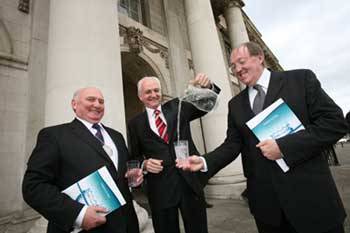L to R- Prof Eric Beatty President IAE, Mr John Gormley Minister for Environment, Heritage and Local Government, Mr John Sweeney Icarus Unit, Maynooth
Floods, droughts and drying reservoirs
What we must do to prepare for the impact of climate
change on our water environment
Wednesday 27th September 2007:
- A high-level cross-border body to plan for climate change and its impact on Ireland’s water environment– coastal flood warning system– a public campaign to eliminate water wastage and — a prohibition on development in areas at high risk of flooding.
- They were just some of the practical and immediate measures recommended in a new report, to meet the challenges set by how climate change will affect Ireland’s water resources and environment. Ireland at Risk: Water, sets out how Ireland’s rainfall pattern will change over the coming century, with major implications for our water environment and makes positive recommendations for action.
- Published by the Irish Academy of Engineering, the report will be launched in Dublin on Thursday September 27, 2007 by Mr John Gormley, Minister for the Environment, Heritage and Local Government. The report emerged from keynote presentations and discussions at a workshop held in Dublin earlier this year, and involving some 40 experts from various disciplines and organisations, north and south.
- “While the impacts of economic and population growth are reasonably predictable, the impacts of climate change are less so, making planning difficult”, says Prof. Eric Beatty, President of the Irish Academy of Engineering. “We need strong leadership from the Governments, north and south of the border.”
- In addition to those mentioned above, among the expert positive recommendations contained in the new report, and aimed at planning for this uncertain future, are that:
- Adaptation: The Governments of the Republic of Ireland and Northern Ireland must act immediately and develop co-ordinated adaptation strategies
- Climate Proofing: Spatial strategies and development and infrastructure plans must be ‘climate proofed’.
- Auditing and Monitoring: Critical infrastructure, such as power transmission and water treatment facilities, should be reviewed for climate proofing and adapted where necessary.
- Flood Protection: Flood protection measures must be flexible enough to cope with an uncertain future.
- Floodplains: A robust methodology is needed for delineating flood plain areas and the avoidance of inappropriate development.
- Sustainable Supplies: Planning starts now for infrastructure to ensure sustainable water supplies.
- Research: More research is needed into the impact of climate change on the water environment.
Research by climate change experts from the ICARUS Unit at NUI Maynooth, included in the report, reveals that on average, we can expect wetter winters and drier summers. The north and west of the country will also become wetter, and the south and east drier. Hence, the most densely populated areas will also become the driest and most thirsty. Rising sea levels and more extreme storms mean that flooding will become more frequent and coastal erosion will increase.
“While adapting to climate change, Ireland also faces a future of continued economic development and a growing population that could reach 8 million by 2100”, says Eric Beatty. “These combined changes will have major implications for water for drinking and domestic use, for industry and farming, as well as the ecology of rivers and lakes, pollution and the spread of water-borne diseases, even hydro-electricity generation. Floods, droughts and coastal erosion will have major social, economic and ecological consequences, including for example, landslides and soil erosion, limiting the land available for agriculture and development, damage to property and the environment, and risks to human health.”
John Sweeney, Head of the ICARUS Unit, at NUI, Maynooth says this major challenge facing the island of Ireland is one where engineers could play an important role in helping to formulate long-term policy and planning for the coming decades.
“Doing nothing is not an option. Ireland is already starting to experience the impacts of climate change, so we don’t have time on our side any more,” he said. “We need to act now, and for the long-term. This report is most welcome as a first initiative. I am delighted to see the engineering profession taking the research findings on board and making such timely proposals for action.”
Ireland at Risk: Water is the first in a series of studies which the Irish Academy of Engineering is undertaking, under the title ‘Ireland at Risk’, exploring potential threats to our social and economic development. The full text of the report, and the five keynote papers – on the impact of climate change and Ireland, coastal flooding and erosion, inland flooding, water supplies, and groundwater resources – are available online at www.iae.ie
For further information, contact: Mary Murphy 087 233 6415
Irish Academy of Engineering spokesperson: Michael Phillips, Dublin City Engineer. Contact through Mary Murphy 087 233 6415
__________________________________________________________________________
The Irish Academy of Engineering (www.iae.ie): The IAE, an all-island body, focuses on long-term issues where the engineering profession can make a unique contribution to Ireland’s economic, social and technological development. Drawing on the wide range of experience of its members across all disciplines of engineering, it works to facilitate communication and dialogue on engineering-related matters of national significance. IAE membership currently stands at just over 100 of Ireland‘s most senior and distinguished engineers.
Related Documents
Part 1 – Ireland at Risk – Water
The impact of climate change on the water environment
Part 2 – Climage Change Scenarios
Climate Change Scenarios
Part 3 – Inland Flooding Impacts
Inland Flooding Impacts
Part 4 – Coastal Areas
Climate Change Impacts on Coastal Areas
Part 5 – Water Supply
Ireland at Risk – Water Supply
Part 6 – Groundwater Supplies
Ireland at risk – Possible implications for groundwater resources of climate change

